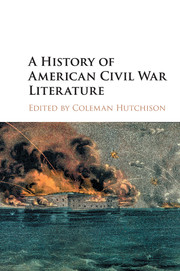Book contents
- Frontmatter
- Dedication
- Contents
- List of Illustrations
- Notes on Contributors
- Preface
- Acknowledgments
- Part I Contexts
- Part II Genres
- 6 Dépôt Culture: The Civil War and Periodical Fiction
- 7 Imitation and Resistance in Civil War Poetry and Song
- 8 Children's Literature
- 9 Writing Lives: Civil War Diaries
- 10 Civil War Memoir
- 11 Civil War Narrative History
- Part III Figures
- Recommendations for Further Reading
- Index
8 - Children's Literature
from Part II - Genres
Published online by Cambridge University Press: 05 December 2015
- Frontmatter
- Dedication
- Contents
- List of Illustrations
- Notes on Contributors
- Preface
- Acknowledgments
- Part I Contexts
- Part II Genres
- 6 Dépôt Culture: The Civil War and Periodical Fiction
- 7 Imitation and Resistance in Civil War Poetry and Song
- 8 Children's Literature
- 9 Writing Lives: Civil War Diaries
- 10 Civil War Memoir
- 11 Civil War Narrative History
- Part III Figures
- Recommendations for Further Reading
- Index
Summary
The Civil War penetrated virtually every aspect of writing for children. Authors adapted prior assumptions and forms to the national emergency and added new values to the canonical strictures to behave morally, obediently, and modestly. “Fighting Against Wrong, and for the Good, the True, and the Beautiful,” the motto of The Little Corporal, a children's magazine published just after the war ended, combined the moral and patriotic urgency reflected in writing for children and youth. Books and magazines helped children analyze the causes and progress of the war and provided a blueprint for their responses to the conflict.
Prior to the war, children's literature focused on self-improvement – temperance, piety, diligence, and pacifism were among the featured values urged on readers – rather than on civic responsibility and on the differences between white and black Americans rather than the injustices of slavery. This was true for religious as well as secular publishers. Although children's literature produced in the 1860s continued to promote moral behavior and offer stories of hardworking, humble, and obedient children and youth, their content also broadened to include political discussions, serious accounts of battles and campaigns, and examples of children taking part in the war effort. Old values were not so much forgotten as complemented by such war-appropriate virtues as patriotism, a commitment to antislavery, and physical courage. Even though the literature produced during the war seems stilted, hopelessly bound by moral absolutes, and populated by priggish do-gooders, its introduction of secular values and adventurous youngsters helped initiate the “shift away from moral didacticism” described by Anne Scott McLeod.
The most important content appeared in the fifteen to twenty northern “juvenile” magazines published throughout the 1860s. Some represented religious denominations or were generically – if enthusiastically – Protestant; others, such as The Student and Schoolmate and Our Young Folks, were secular enterprises. Novels also entered the fray. They featured exciting tales of danger, escape, and treachery in which characters learned how their individual efforts contributed to the survival of their families, communities, or nation. In the South, wartime shortages of ink, paper, and skilled printers prevented publishers from producing much in the way of literature, but throughout the Confederacy patriotic publishers put out schoolbooks with names such as The Dixie Primer, The Confederate Spelling Book, and A New Southern Grammar.
- Type
- Chapter
- Information
- A History of American Civil War Literature , pp. 119 - 133Publisher: Cambridge University PressPrint publication year: 2015



